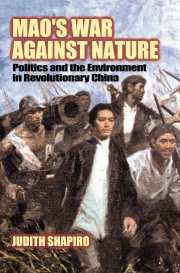Book contents
- Frontmatter
- Contents
- Chinese Measurement Equivalents
- Preface
- INTRODUCTION
- 1 POPULATION, DAMS, AND POLITICAL REPRESSION
- 2 DEFORESTATION, FAMINE, AND UTOPIAN URGENCY
- 3 GRAINFIELDS IN LAKES AND DOGMATIC UNIFORMITY
- 4 WAR PREPARATIONS AND FORCIBLE RELOCATIONS
- 5 THE LEGACY
- Notes
- Bibliography
- Index
- Plate section
5 - THE LEGACY
Published online by Cambridge University Press: 15 August 2009
- Frontmatter
- Contents
- Chinese Measurement Equivalents
- Preface
- INTRODUCTION
- 1 POPULATION, DAMS, AND POLITICAL REPRESSION
- 2 DEFORESTATION, FAMINE, AND UTOPIAN URGENCY
- 3 GRAINFIELDS IN LAKES AND DOGMATIC UNIFORMITY
- 4 WAR PREPARATIONS AND FORCIBLE RELOCATIONS
- 5 THE LEGACY
- Notes
- Bibliography
- Index
- Plate section
Summary
As we have seen, political repression, utopian urgency, dogmatic formalism, and state-sponsored relocations affected and distorted Chinese relationships with nature during the Mao years. Maoist controls interfered with deep cultural traditions such as the intellectual's duty to speak out in order to help top leaders become better governors, while Mao's disrespect for scientific principles and ambition to transform the country in a great leap led China on a self-destructive rush toward ecosystem collapse and famine. Local leaders and farmers were forced to implement inappropriate models and were forbidden to continue traditional sustainable practices like planting suitable crops and building terraces judiciously on gentle hillsides. Overemphasis on strategic concerns led to destructive and premature development of the interior, connections to ancestral homelands were ruptured when the state ordered massive population shifts, and military values came to dominate all others. As military discipline, mobilization, regimentation, redeployments, and campaigns moved the Maoist war against nature from the realm of metaphor and propaganda into reality, millions down the chain of command were pressed to obey orders in the service of Maoist goals. The lack of freedom to behave responsibly toward the natural world was a hallmark of the Mao years. However, as I have also indicated, responsibility for these missteps lies with others in addition to the top leadership.
External influences, as well as Chinese traditions, enabled Maoist social control. Environmental problems were profoundly influenced by China's links to Soviet mentors with appetites for grandiose projects and state-led social engineering.
- Type
- Chapter
- Information
- Mao's War against NaturePolitics and the Environment in Revolutionary China, pp. 195 - 216Publisher: Cambridge University PressPrint publication year: 2001

